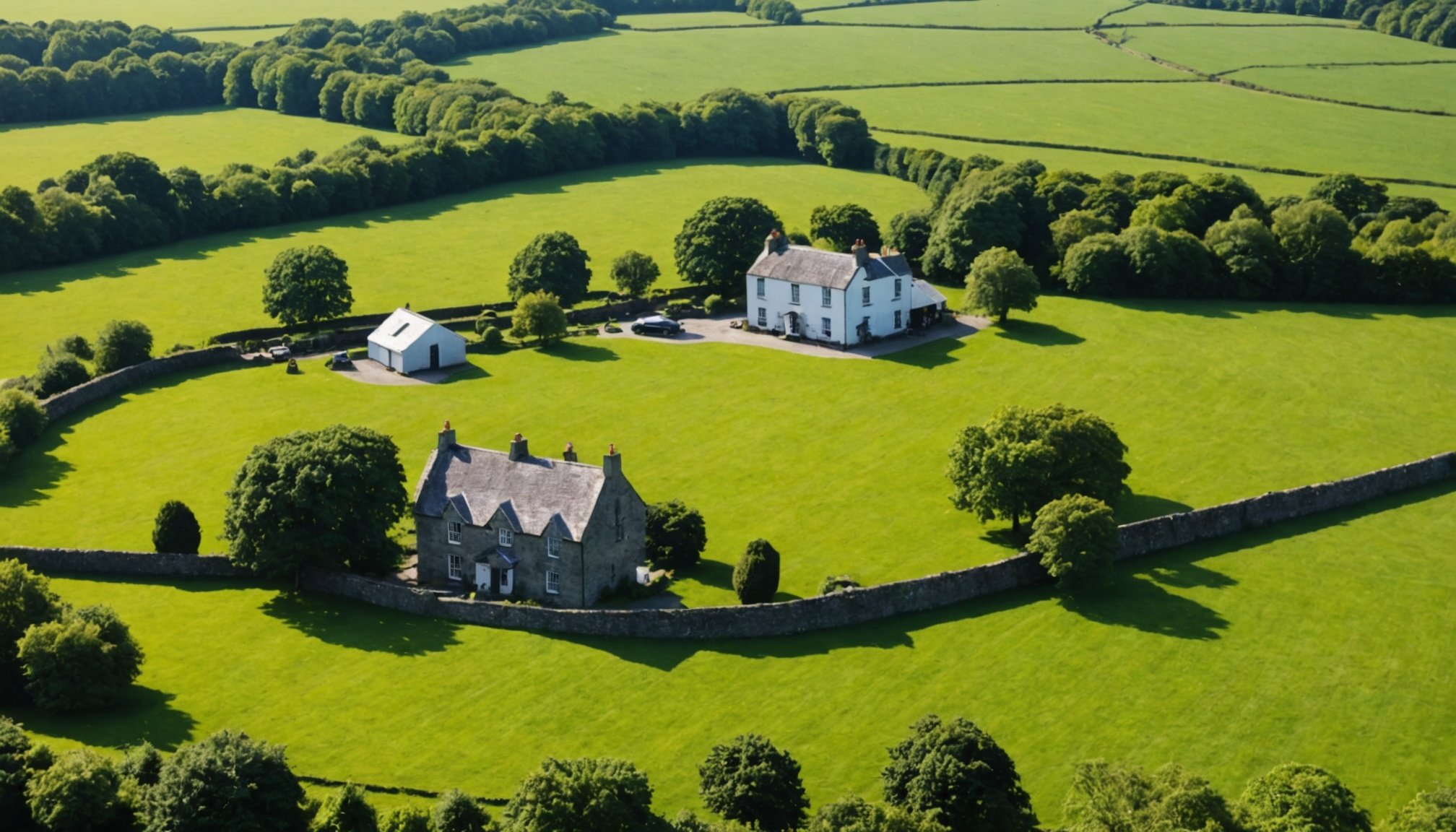Overview of Rural Estate Management Challenges in Northern Ireland
Rural estate management in Northern Ireland presents a unique set of challenges. The current landscape demands a detailed understanding of local conditions to navigate effectively. Estates play a significant role in the economy, yet they face hurdles that impede sustainable development.
Key challenges in rural estate management here are shaped by geographic and economic factors. The topography of Northern Ireland often complicates construction and land use. Additionally, maintaining heritage sites requires careful balance with modern development needs. These estates must meet regulatory requirements while preserving cultural heritage and fostering economic growth.
This might interest you : Brexit and Its Implications for Non-UK Residents: Navigating Property Ownership Challenges
Another vital challenge is balancing agricultural productivity with environmental conservation. With increasing pressure on land resources, managers are tasked with finding effective ways to protect biodiversity while supporting economic activities.
Addressing these challenges is crucial for sustainable rural development. Solutions might involve integrating innovative agricultural practices or adopting policies that support both development and conservation. Effective rural estate management requires clear strategies which are adaptable, resource-efficient, and community-focused.
Also read : Essential Considerations for Purchasing a Dream Farmhouse in the Picturesque Welsh Countryside
By understanding and tackling these challenges, Northern Ireland can pave the way for rural estates that support economic vitality and preserve the natural and cultural environment. Solutions-oriented approaches are necessary to safeguard the future of these vital landscapes.
Legal Factors Impacting Rural Estate Management
Navigating the legal framework surrounding rural estate management requires a comprehensive understanding of relevant laws. In such settings, property rights form the basis of ownership and usage, determining who can do what with the land. This is essential to ensure that all activities comply with existing regulations.
Overview of Relevant Laws
Rural estate management is influenced by numerous legal instruments, including land use regulations. These laws not only govern the scope of how land can be utilized but also influence environmental conservation efforts. Such regulations can present challenges for landowners, who must balance agricultural productivity with legal compliance.
Challenges Posed by Property Rights
One significant challenge is the enforcement of property rights, which can be complex in rural areas. Disputes may arise over boundaries or ownership, necessitating careful legal navigation. Furthermore, restrictive land use regulations might limit potential developments or changes in land use, forcing stakeholders to seek alternative solutions.
Recent Legal Changes
Legal shifts, often aimed at fostering sustainable practices, can introduce new requirements for rural estates. These changes might involve stricter environmental controls or incentives for ecological stewardship. Staying informed of such developments ensures that estate managers can adapt swiftly, minimising compliance risks while seizing opportunities for enhanced land utilisation.
Economic Factors Influencing Rural Estates
Rural estates often face a distinctive set of economic challenges impacting their growth and sustainability. The agricultural viability of these lands is intricately tied to economic conditions that influence productivity and gross margins. In Northern Ireland, for instance, Brexit has introduced significant complexities. With changes in trade agreements, there are fluctuations in market access, which directly affect input costs, thereby impacting the profitability of farms.
Agricultural economics play a pivotal role. For example, an increase in operational costs for essentials like feed, seeds, and fertilisers can drastically reduce profit margins for farmers. Moreover, adverse weather patterns and government policies on subsidies further complicate the issue, making economic sustainability a day-to-day challenge for many rural estate owners.
However, potential investment opportunities can offer solutions. Investors look for areas where they can generate returns through diversification, such as renewable energy projects or eco-tourism, which not only provide financial returns but also promote sustainability. Investments in infrastructure and technology improve efficiency in agricultural practices. Exploring partnerships in agribusiness initiatives could offer a more stable economic future for these communities, aligning with global trends toward sustainable agricultural practices. By capitalising on innovative approaches, rural estates can navigate economic hurdles and improve their viability over the long term.
Social Dynamics and Community Engagement
In the realm of rural communities, community involvement serves as a cornerstone of effective estate management. The intrinsic dynamics within these communities emphasize the need for robust stakeholder engagement to foster economic and social wellbeing.
A key challenge in these areas is the varying levels of community involvement, often hindered by geographical isolation and limited resources. Engaging stakeholders effectively demands innovative approaches—personalised communication, transparent decision-making, and recognizing the unique culture of each community are essential strategies. Residents and stakeholders should be encouraged to participate in discussions and decisions affecting the future of their community.
Promoting community involvement can be facilitated through forming local advisory groups, which can provide vital insights into the specific needs of rural communities. Initiatives that incorporate education and training also prove beneficial. They pave the way for increased participation and empowerment among locals.
Best practices for enhancing stakeholder engagement include hosting regular community meetings and workshops, which offer platforms for open dialogue and feedback. Another effective method is leveraging partnerships with external organizations to bring additional resources and expertise to the community.
Ultimately, achieving successful rural estate management requires a genuine understanding of the social dynamics at play and a commitment to nurturing active participation from all community members.
Practical Solutions and Strategies
Finding effective actionable strategies for rural management solutions can be challenging, yet rewarding. Aligning best practices with specific needs is essential for success. Tackling rural issues demands innovative strategic approaches. For instance, embracing crop diversification can mitigate market dependency risks.
Employing best practices can transform management efficiency. Rural management solutions that have thrived are often those that capitalise on community engagement. Co-operative farming can amplify resources and share knowledge, proving extraordinary value. Consequently, engaging local populations can fuel vibrant economic growth.
Implementing effective strategies can be well-supported by leveraging available resources. Utilising agricultural extensions services furnishes valuable knowledge. Online platforms offer practical toolkits and webinars, which enhance skillsets and inform decision-making. Producing efficient interventions requires a sophisticated rhythm of strategies, resources, and community interaction.
Emerging technologies contribute extensively to rural solutions. Drones provide precise surveillance over crops, assisting farmers in decision-making. Off-grid solar energy systems answer to rural electrification, proving pivotal in remote areas. Exploring these technologies promises an exciting new era for rural development.
Ultimately, crafting coherent and well-thought-out solutions in rural management can create sustainable success. Resources that facilitate the implementation of these strategies enable rural estate managers to achieve their objectives while enhancing community welfare.
Case Studies and Real-World Examples
Exploring case studies offers invaluable insights into effective estate management strategies. In Northern Ireland, several success stories highlight innovative practices that can be adopted elsewhere. One notable case study involves a project focused on sustainable land management, which not only improved local biodiversity but also increased community engagement through educational workshops. The result was a thriving ecosystem and empowered local residents who actively participated in maintaining their environment.
Another success story from Northern Ireland is the regeneration of urban spaces into green areas. This initiative addressed both environmental sustainability and residents’ well-being, turning neglected plots into vibrant community gardens. Lessons learned from these projects underscore the importance of tailoring solutions to local needs and involving stakeholders at every step.
These examples of estate management success stories in Northern Ireland serve as valuable benchmarks for future practices. They demonstrate that integrating community input and sustainable practices can yield positive outcomes. Future initiatives can draw from these case studies by emphasizing adaptability and inclusiveness in planning and execution.
The key takeaway here is that with innovative strategies and community involvement, substantial improvements can be made, enhancing both biodiversity and quality of life. Learning from Northern Ireland‘s success stories provides a practical framework for implementing effective estate management solutions elsewhere.
Expert Insights and Interviews
Engaging with Expert Perspectives in rural estate management offers invaluable understanding of current trends and future strategies. Through detailed interviews, leading professionals have shared their vision and insights, helping shape the industry’s path forward.
With a wealth of experience, these experts provide nuanced Industry Insights. For instance, a common recommendation is the integration of sustainable practices to support long-term ecological balance in managing rural estates. This not only preserves the environment but also enhances the land’s value over time.
Additionally, interviews emphasize the importance of adaptive management strategies that respond to changing circumstances and market demands. By incorporating flexibility and innovation, estate managers can remain competitive and efficient.
The Relevance of Expert Opinions extends to influencing policy-making and educational curricula in land management courses. By disseminating these interviews, stakeholders and newcomers alike can make informed decisions that support sustainable and effective estate management.
To summarise, these expert exchanges not only provide knowledge but also inspire interviews to rethink conventional methodologies and adapt to emerging challenges. Such dialogues ensure that the industry remains dynamic, benefiting both landowners and the broader community.
Relevant Policies and Future Trends
Current policies shaping rural estate management are crucial for stakeholders ranging from landowners to policymakers. In Northern Ireland, these policies are designed to balance economic growth with environmental sustainability. For example, agricultural subsidies motivate landowners to adopt eco-friendly practices, which align with broader European Union directives. Rural development initiatives aim to revitalise underdeveloped areas, increasing opportunities for local residents while preserving regional heritage.
Future trends suggest a continued focus on sustainable practices. As climate change remains a central issue, stakeholders are expected to adapt to new regulations targeting carbon footprints and biodiversity conservation. Digital technology is also likely to play a significant role; smart farming tools and blockchain for supply chain transparency are emerging trends gaining traction.
For policymakers, the challenge lies in harmonising these technological advancements with traditional land-use practices. Adoption of such technologies is vital for enhancing productivity and environmental compliance, but it also requires investment and education. Stakeholders should thus prepare for shifts requiring both financial and knowledge-based resources to sustain competitiveness and ecological responsibility. Those engaged in rural estate management in Northern Ireland must therefore remain informed and adaptable to meet these evolving demands effectively.











